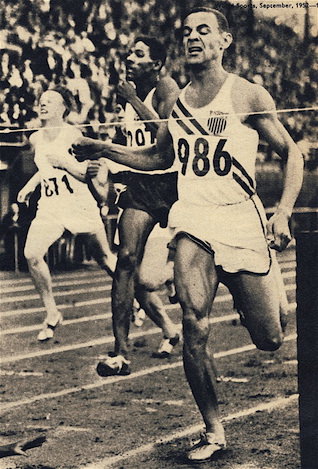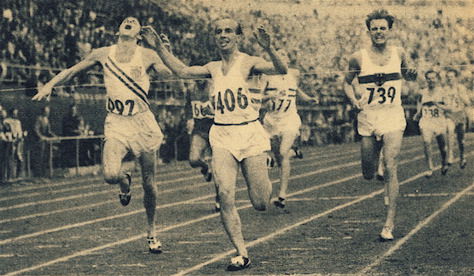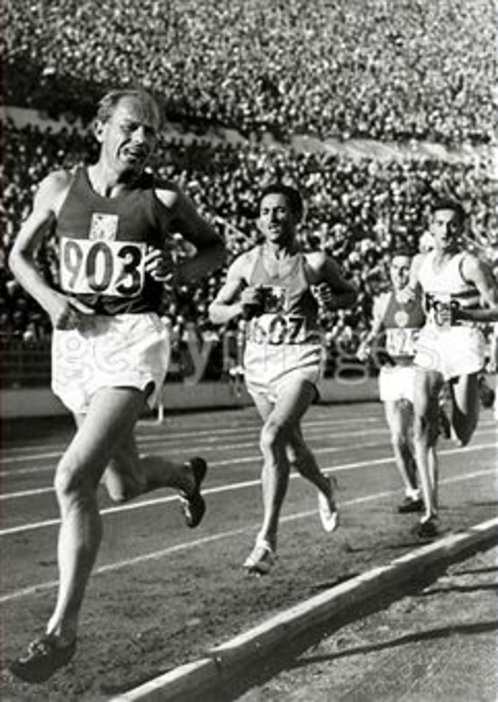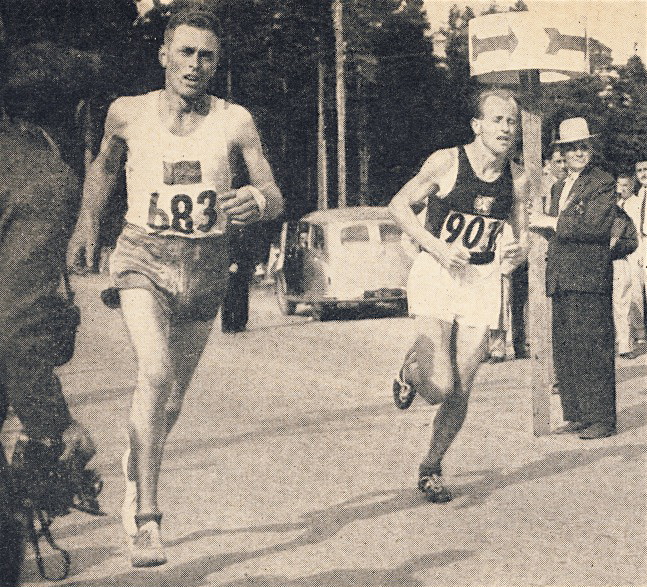1952 OLYMPIC GAMES
HELSINKI, FINLAND
JULY 19-AUGUST 3
Performances were much better than in the previous Olympics. Recovery from the stresses and deprivations of the Second World War meant that runners were able to train harder and eat properly. Zatopek, with his triple crown, outshone all other runners.
800
 |
| Whitfield holds off Wint. |
Mal Whitfield, 31, the 1948 800 Olympic champ, showed his strength and maturity in this race. He had been flying bombing missions in the Korean War, but was given time off for the Olympics. After a false start by Nielsen, the race started slowly with the elegant Wint leading the first lap in 54.0. Whitfield, who had started last to stay out of the wind, moved up a few places on the back straight and then eased into third at the bell. On the back straight he surged past Heinz Ulzheimer of Germany and his longtime rival Arthur Wint to gain the lead just before the bend. These two held on to him round the last bend, but he had control of the race. When Wint got within a yard, Whitfield was able to accelerate just enough to hold him off. It was a classy and economic performance by the American, who had the 400 and the 4x400 relay ahead of him. “I had plenty left in the stretch,” he told Track & Field News.
1. Mal Whitfield USA 1:49.2; 2. Arthur Wint JAM 1:49.4; 3. Heinz Ulzheimer GER 1:49.7; 4 Gunnar Nielsen DEN 1:49.7; 5. Albert Webster GBR 1:50.2; 6. Gunther Steines GER 1:50.6.
1,500
 |
| Barthel wins from McMillen, while Lueg hangs on for third. |
For the first time there were not only heats but also a semi-final for this event. Thus to excel in the final, a runner had to be strong enough to run three hard races in a short time-span. This meant that a successful runner in the finals had to be used to training hard almost every day—something that gentlemen runners in England did not do at this time. A new world was evolving for elite track runners: only the hard trainers would succeed. The Zatopeks and Piries were the runners of the future—amateur runners with a professional attitude.
The Helsinki experience of Roger Bannister illustrates this new reality for major championship track races. Bannister had run an amazing 2:52.9 3/4 time-trial ten days before the Games. This showed he was good enough to beat anyone in a single race. So he was shocked to find out subsequently that the Olympic Committee, due to high entry levels, had decided to have two qualifying rounds for the 1,500; further, the heats, semis and final were to be on three consecutive days. This late announcement was totally unexpected as there had never been semis in this event. Bannister later wrote: “It was crazy for such an exhausting distance. No man who trained as I did could possibly run three good races in three consecutive days.” (First Four Minutes, 146)
Bannister wrote that the first round (3:56) “did not exhaust me unduly.” (First Four Minutes, 152) But he was sleeping poorly, and the semi, where he finished only fifth (3:50.6), left him “blown and unhappy.” (FFM, 156) During the night between the semi and final, his legs ached so much that he could not sleep. For the final he “hardly had the strength to warm up.” (FFM,158)
A runner like Josy Barthel (25), on the other hand, who had trained rigorously under Woldemar Gerschler, possessed the strength to run his heat and semi (3:51.6 and 3:50.4) with little trouble and thus perform well in the final. But Barthel, who came to the Games with a PB of only 3:51, had not been considered likely to medal. Apart from Bannister, Werner Lueg of Germany was given the best chance of winning. Another threat was Bob McMillen, who had won the US trials and had a 4:07 Mile to his credit. McMillen had run in the 1948 Olympic Steeplechase, but had fallen three times.
Lamers of Germany made the pace fast for his compatriot Lueg, passing 400 in 57.8. However, he slowed in the second lap and Lueg felt he had to push the pace himself. Lueg led through 800 in 2:01.4 and 1,200 in 3:03—surely slower than he had wished. Lueg continued to lead into the back stretch, while behind him there was considerable jockeying. Aberg, El Mabrouk and Bannister all challenged the German, but he held onto his lead into the final bend. Bannister was in a perfect position for his patented sprint, but he had “a sickening feeling of exhaustion” and was unable to change gears. Coming off the bend, Barthel put in a dramatic sprint and drew level with Lueg at 50m. But finishing even faster than Barthel, the American McMillen was catching up. After Barthel passed Lueg, he was almost caught by McMillen at the tape. The first three were separated by only 0.4 of a second. Just behind these three was Bannister, who finished in the same time as El Mabrouck, only 0.8 behind the winner.
Barthel, who had a 3:51 PB coming into the Games, improved to 3:45.1 in the final. He had been coached to perfection by Woldemar Gerschler. Later, on talking to the German coach, British runners were “astounded” to hear the details of Barthel’s hard training before the Games.
1. Josy Barthel LUX 3:45.1; 2. Robert McMillen USA 3:45.2; 3. Werner Lueg GER 3:45.4; 4. Roger Bannister GBR 3:46.0; 5. El Mabrouk FRA 3:46.0; 6. Lamers GER 3:46.8.
5,000
See Great Races # 7.
1, Emil Zatopek CZE 14:06.6; 2. Alain Mimoun FRA 14: 07.4; 3. Herbert Schade GER 14:08.6; 4. Gordon Pirie GBR 14:18.0; 5. Chris Chataway GBR 14:18.0; 6. Les Perry AUS 14:23.6.
10,000
 |
| Zatopek pushes the pace. Mimoun and Pirie follow. |
Former Finnish Olympic champions Nurmi and Kohelmainen were in the stands as 32 runners set off behind Perry of Australia and Anufriev of Russia. Very few had thoughts of beating the amazing Zatopek, who was the reigning Olympic champion and the current WR holder. But Anufriev had given Zatopek a strong challenge over 10,000 earlier in the year in Kiev, and he must have thought the Czech beatable. After lingering at the back for six laps, Zatopek went into the lead. Through 3,000 (8:48) and 5,000 (14:43) he was closely followed by Frenchman Mimoun and a youthful Gordon Pirie of Great Britain. After leading briefly, Pirie dropped back at 6,500. Mimoun was still with Zatopek at 8K. Behind them Anufriev, Pirie and Sando were in a private battle. Sensing a weakness in Mimoun round 8K, Zatopek surged and ran alone for the rest of the race to win from Mimoun with almost 16 seconds in hand. Anufriev, who had fallen back to sixth mid-race, worked his way back to third and held off Posti and Sando for the bronze. The gallant Sando ran 22 laps with only one shoe. What would he have done with both shoes?
I. Emil Zatopek CZE 29:17.0; 2. Alain Mimoun FRA 29:32.8; 3. Aleksandr Anufriev URS 29:48.2; 4. Hannu Posti FIN 29:51.4; 5. Frank Sando GBR 29:51.8; 6. Walter Nystrom SWE 29:54.8.
Marathon
A surprise entry for this race was Emil Zatopek, who had already won two gold medals but who had no Marathon experience. Englishman Jim Peters had set a World Best a few months earlier with 2:20:42. So to challenge the Czech, he set very fast pace, opening up a lead of 100m after one mile. At 5K in 15:43, he was 19 seconds ahead of a group of five that contained Zatopek, Jansson and Cox. At 10K Peters’ lead was 17 seconds; behind him Jansson and Zatopek had broken free of Cox, Corno and Cabrera. These two gradually gained on Peters in the next 5K, actually catching him right at the 15K mark (47:58). Peters could only stay with them for 3K.
 |
| Jansson (683) and Zatopek lead at the halfway mark. |
The duo passed 20K in 64:27, ten seconds ahead of Peters. Soon Zatopek took the lead, passing 25K in 81:30. He had five seconds advantage over Jansson and 28 seconds over Peters. It was this point that Zatopek made his major break while Jansson stopped for liquid. At 30K (98:42) he led Jansson by 26 seconds. Peters was hanging on to third, just 41 seconds behind Jansson. By 35K Zatopek had stretched his lead over Jansson to 65 seconds, and at 37K Peters dropped out. By 40K Zatopek had a lead of 2:15 from the Argentine runner Corno, who had passed Jansson. He stretched this lead a little, reaching the tape 2:32 ahead of Corno. His win gave him an unprecedented third gold in the distance events.
Argentina continued to show well in this race: Corno was an impressive second and Cabrera was sixth, with a time more than eight minutes faster than his 1948 Olympic victory. Jansson had made a valiant attempt to stay with Zatopek, probably sacrificing second place in the process. The race was a big disappointment for Peters; he was probably handicapped by a chill he caught in the unheated plane that had taken him to Finland.
1. Emil Zatopek CZE 2:23:03.2; 2. Reinaldo Corno ARG 2:25:35; 3. Gustav Jansson SWE 2:26:07; 4. Yoo Chil Choi KOR 2:26:36; 5. Veikko Karvonen FIN 2:26:41; 6. Delfo Cabrera ARG 2:26:42. 
2 Comments